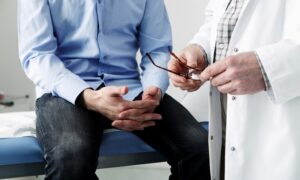
Diet and exercise are critical to good health for men, but so are regular health checks. Health risks increase as we age, and a full medical check-up is often the only way to detect early warning signs of illness and disease.
Men’s health issues, such as testosterone deficiency, erectile dysfunction, bowel cancer, and prostate cancer, have greater success rates when treatments start after early detection. Detecting health problems early on also has other benefits, including more affordable health care and shorter treatment times.
Give yourself the best chance of a long and healthy life by getting regular health screening for the following men’s health challenges.
Prostate Screening

Testosterone Deficiency Testing
As part of an overall health check-up, men should consider measuring their testosterone levels. Testosterone naturally increases as men age and is a primary sex hormone that performs several roles in the body, including regulating bone density.
Recent research has also linked testosterone to brain function and a healthy metabolism. Low testosterone levels can lead to health problems and a lower quality of life, including depression, poor memory, and low sex drive. The condition is also known to increase the risk of heart disease, osteoporosis, and diabetes.
Sexual Health Screening
Sexual health screening for sexually active men is a necessary health check-up to protect yourself and your partners against sexually transmitted infections (STIs). Should you contract an STI, knowing about it early on will facilitate treatment and prevent you from unknowingly spreading the disease.
Bowel Cancer Screening
Bowel cancer is the 4th most common type of cancer, and the risks increase as you age. Early detection when the disease is relatively easy to treat will significantly increase the chance of a successful cure to more than 90%. In the UK, it’s recommended men over 60 regularly get a health screen check for bowel cancer.
Thyroid Health Check-Up
The thyroid is a gland in your neck, positioned below the adam’s apple, with two lobes on either side of your windpipe. The thyroid is responsible for producing two hormones, thyroxine (T4) and tri-iodothyronine (T3). The T3 hormone’s primary role is regulating your metabolism.
Medical professionals recommend a health check-up on the thyroid at least once a year if you have ever had thyroid problems. However, if you are experiencing any of the following symptoms, you should book in for a complete medical check-up on your thyroid as soon as possible:
- Thickening or swelling of the neck
- irregular heart rate
- high cholesterol
- osteoporosis
Full Cholesterol Testing
Cholesterol is a fatty substance in your blood primarily caused by eating too many fatty foods, lack of exercise, and being overweight. Smoking and drinking can also lead to an excess of bad cholesterol.
Cholesterol attaches to the walls of your blood vessels to limit the flow of blood and increase your risk of heart disease and stroke. Unfortunately, the only way to diagnose high cholesterol is to test for it as it produces no noticeable symptoms until it’s too late.
Fortunately, you can reverse high cholesterol by adopting healthier eating habits and exercising. If you eat a diet high in fats, you should consider having a cholesterol test during your next full medical check-up. There are also medications your doctor may prescribe to help you quickly reduce your risk of heart attack and stroke while you transition to a healthier lifestyle.



